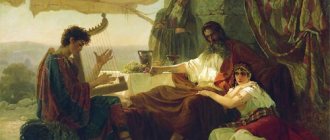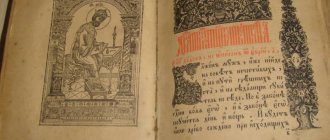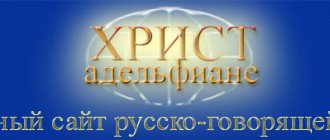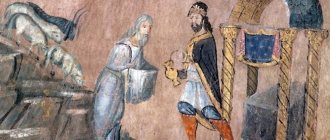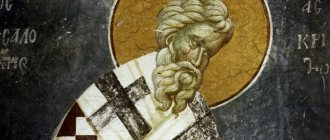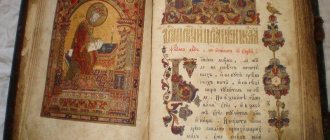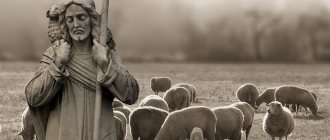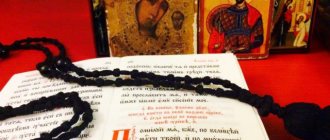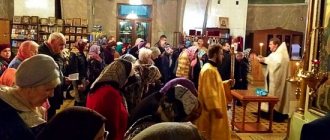Psalter (Psalter) is a book of the Old Testament, which consists of 150 or 151 psalm songs. In some languages the book is called Psalms . The Psalter is located among the teaching books of the Old Testament after the book of Job. The Psalter became a liturgical book even under David. Later, the liturgical use of the Psalter passed to Christians.
The importance of the book of Psalms is evidenced by the fact that it has come to us in the largest number of manuscripts among all the books of the Old Testament.
Read the Psalter / Psalter
The Psalter contains 150 psalms:
| 1-10 | 11-21 | 22-32 | 33-44 | 45-55 | 56-66 | 67-77 | 78-88 | 89-99 | 100-110 |
| 111-121 | 122-132 | 133-143 | 144-150 |
Numbering of psalms in the Psalter
The numbering of the psalms differs in Hebrew and Greek. The Orthodox Church uses Greek numbering. The Catholic Church uses both numbering options. In our description we will use the Greek version (150 Psalms).
Inscriptions in the Psalms.
Many psalms have inscriptions - additional information about the authors, performers of the psalms, and the events to which the psalms are dedicated are indicated. Translating the inscriptions has proven to be particularly difficult, so there are many options for translating them. Translators can only guess about the meaning of some words.
The inscriptions of psalms often indicate the order in which they should be sung. The musical instrument and motive to which the psalm must be sung have been determined.
Story
Compared to the first king of Israel, Saul, a mature husband and father, a strong and strong warrior, King David at the time of the “anointing” was a frail youth who talentedly played the kinnor, a stringed instrument. However, David had no shortage of courage and ingenuity - just remember the legend of his victory over the giant of the enemy Philistines, Goliath. And yet, David paved the way to eternity for himself precisely with his songs of praise and appeals to God, and not with battles. It was already in Rus' that they were called psalms, since one of the stringed musical instruments of the Israelites was the psaltirion, and in Greek “psalm” means song.
Young David plays the kinnor in front of King Saul. N. Zagorsky, 1873
Many generations after the Russian prince Vladimir the Red Sun learned literacy and faith from the psalter. The Psalter of 150 (+1) songs has firmly entered the consciousness of Christians, and in particular the Orthodox person. But does everyone understand the meaning of the psalms? This question tormented the most progressive scientific minds of Russian philologists of recent centuries. It is precisely us, contemporaries who are not familiar with the Old Church Slavonic language, and even more so with Ancient Greek or Hebrew, who have a particularly difficult time if we intend to comprehend the essence of what was sung by David and his followers. And although the elder clergy explain in such cases: “... everything will be revealed in due time” (Sir 39:22), let’s push ourselves a little towards knowledge in order to shed light on some of the existing translations of the liturgical Psalter.
“Dawn had not yet broken out, and I was already standing with the harp; My soul yearned for prayer, and my spirit burned with faith,”
Such lines were born when thinking about King David from the Russian Decembrist poet Fyodor Glinka in the 18th century. Long before the moment when our literary classics decided to subject the texts of the psalms to rhymed treatment for real songfulness, the Bible was brought to the Slavs from seventy-two Greek elders-scribes. The Septuagint was the name of their translation of the divine book from Hebrew to Greek. That is, in fact, the text was translated into Old Church Slavonic from Greek with some errors. A little time passed - and a translation from the original Jewish collection appeared in Rus', which was called synodal, and according to which services are often conducted in Orthodox churches even now.
But the music is cacophonous, and the lyrics have no rhyme. The fact is that the ancient Jews, of course, did not have the achievements of modern culture of the last three thousand years. They sang whatever came to mind at the moment. Art, as such, had no other value than the conversation of a person’s soul and feelings with God. Is it possible to imagine such a conversation between David, for example: “God, we went on a campaign against the Philistines, but they won, we were defeated... No, no, not like that, it sounds ordinary... God, wait, now I’ll correct it a little and sing more beautifully ... We met the Philistines on the battlefield, I was the first to throw my spear at them...”? It's funny, isn't it? The peoples lived and fought sincerely, without preparation, without rehearsals, without “playing to the public.” Complete improvisation, impromptu and the philosophy of constantly searching for the meaning of one’s existence on earth. If there were rules for song construction, they were very sketchy and primitive. Modern literary scholars who have analyzed psalms of praise have generally distinguished three forms of parallelism in their writing. But I don’t think that David and other ancient Jews, who glorified God with their songs, specifically worked on the phrases: “So, here I used synonyms, which means in the next verse I will address God through opposing antonyms...”. No, in today’s civilization it is customary to structure the psalms for easier understanding. On synonymous, antithetical and synthetic parallelism, as well as 20 kathismas (parts).
Authorship
In the inscriptions of psalms there are often proper names, but it is not always clear whose names these are - the author, the performer, or the person to whom the psalm is dedicated. The author of the Psalter is generally considered to be King David, although absolutely all researchers are confident that the Psalter is the fruit of the work of more than 10 authors. Moreover, the book was created over a long time - perhaps even more than a dozen generations. The time of creation of the psalms is from the time of Moses until the return from Babylonian captivity.
In the inscriptions of the Psalter the following names are indicated as authors:
- David,
- Asaph - chief psalmist under David,
- The sons of Korach are the temple gatekeepers,
- Adam,
- Abraham,
- Yeman,
- Idifun
- Moses, etc.
The Psalter was created gradually as a product of collective creativity and was subjected to numerous editions during its creation.
Text of prayer Psalm 84
In Church Slavonic
1 Finally, son of Korah, psalm
2 Thou hast been pleased, O Lord, with Thy land; Thou hast returned the captivity of Jacob:
3 Thou hast forsaken the iniquities of Thy people, Thou hast covered all their sins.
4 Thou hast tamed all Thy wrath; thou hast returned from the wrath of Thy wrath.
5 Bring us back, O God of our salvation, and turn away Your wrath from us.
6 Are you angry with us forever? Or will You spread Your wrath from generation to generation?
7 O God, You will return to revive us, and Your people will rejoice in You.
8 Show us, O Lord, Your mercy, and give us Your salvation.
9 I will hear what the Lord God speaks about me: for He speaks peace against His people, and against His saints, and against those who turn their hearts to Him.
10 Moreover, His salvation is near to those who fear Him, to bring glory to our land.
11 Mercy and truth were met, righteousness and peace were embraced.
12 Truth rose up from the earth, and righteousness came from heaven,
13 For the Lord will give goodness, and our land will yield its fruit.
14 Righteousness will go before Him and set its feet in the way.
In Russian
1 To fulfillment, O children of Korah. Psalm.
2 Lord! You have had mercy on Your land, You have returned the captivity of Jacob;
3 You have forgiven the iniquity of your people, you have covered all their sins,
4 I have taken away all Your wrath, I have turned away the fierceness of Your anger.
5 Restore us, O God of our salvation, and end Your wrath against us.
6 Will you be angry with us forever, will you spread out your wrath from generation to generation?
7 Will You not revive us again, so that Your people may rejoice in You?
8 Show us, O Lord, Thy mercy, and grant us Thy salvation.
9 I will listen to what the Lord God says. He will speak peace to His people and His chosen ones, but let them not fall into folly again.
10 So His salvation is near to those who fear Him, so that glory may dwell in our land!
11 Mercy and truth meet, righteousness and peace kiss each other;
12 truth will arise from the earth, and righteousness will come from heaven;
13 And the Lord will give good, and our land will yield its fruit;
14 righteousness will go before Him and set its steps in the way.
Summary and structure of the Psalter
The Psalms of the Psalter are conventionally divided into 4 groups:
- Personal complaints.
The scheme of a psalm of this type: appeal to God -> description of the situation -> trust in God -> request -> offering praise to God.
- People's laments.
They have a structure similar to personal lamentations, but are a collective appeal to God.
- Psalms of praise to the Lord.
The outline of a psalm of this type: a promise to give praise to the Lord -> a description of the blessings sent down -> deliverance -> an offering of praise -> an instruction to people to trust in God
- Hymns.
Celebrating the greatness of God and His mercy.
In addition to the psalms that belong to these four groups, mention should also be made of the psalms of wisdom, songs of ascension, and royal psalms.
Songs of Ascension are psalms sung by pilgrims as they ascend Mount Zion.
Royal psalms are psalms that describe important events in the royal life, for example, the ascension to the throne.
The emergence of psalms. Hebrew original
Once in the 18th century, Johann Gottfried Herder, a famous German writer of the Enlightenment, said: “It is worth ten years to study Hebrew in order to read Psalm 104 in the original.” It is unlikely that the second king of Israel, David, imagined that his musical appeals to God would be regularly read throughout future centuries by a huge part of the world's population. The king had the difficult fate of constant wars, the fight against diseases and misfortunes in unsanitary conditions, which, frankly speaking, was not easy to survive. And yet, David raised the country from its knees, achieved its prosperity, and he himself lived until he was 70 years old, and died by accident, tripping on the stairs. How can one not think about divine protection? His faith in God was so strong that he did not start a single business without God's blessing. And he performed his prayers with talent and inspiration, by the standards of his time, to music. His scribes wrote down several psalms for him. Current scientists argue about their exact number, approximately this figure is 78 out of 150. Subsequently, some believers and talented Israelis began to imitate David. For example, the authors of the Book of Praises that has survived to this day are also Solomon (the youngest son of David, heir and third king of Israel), Moses (a prophet who wandered in the desert for 40 years), Heman, Ethan, Asaph (David’s associates) and others.
Reading today the psalter of the New Testament, adapted for Orthodox people in recent centuries by various translators, you can direct your pure thoughts to God, as the ancient Jews did. But it’s difficult to imagine their language, their expression and emotionality. Experts note that the original words of the Psalter consisted of two or three syllables. This was characteristic of denoting a special rhythm - after all, God was invisible and somewhere high in the sky, which means you need to “reach out” to him. The songs, in which there were prayers, praise to the Lord, confession, hope for the coming of the savior Messiah, and repentance for sins, were filled with passionate screams. By the 10th century AD. e. this text was copied many times by scribes on parchment, sometimes undergoing some changes. Over time, divine hymns began to be sung by a huge choir of Levites and worshipers. “Greco-Slavic poetry of psalms,” says cultural historian Georgy Fedotov, “is of a different quality than in the Jewish original. The sharpness is softened, the pain is muffled, the scream is quieted. A veil of splendor is thrown over the rebellious confession of the soul.”
Interpretation of the Psalms.
Many editions of the Psalter contain interpretations of the psalms. Of the ancient interpretations, the following interpretations are especially popular:
- John Chrysostom,
- Ambrose,
- Augustine,
- Theodoret of Cyrus,
- Euphemia Zigabena.
From new interpretations:
- Tolyuka,
- Ewald;
- Bishop Feofan,
- Archpriest Vishnyakov.
In no other Old Testament book is personal faith in God shown in as many ways as in the book of Psalms. The Book of Psalms is a collection of religious poetry. Many psalms of the Psalter are addressed to God and are a reflection of personal religious feelings. The Psalms reflect the joy of being able to communicate with God. Through a psalm a person can express reverence for God. The psalms also reflect folk wisdom.
Translation by Vasily Kapnist
A little earlier than Pavel Yungerov lived the wonderful Russian poet and playwright Vasily Vasilyevich Kapnist. He was friends with the famous Derzhavin, created the comedy “Sneak” - the prototype of “The Inspector General” and “Woe from Wit”. Like many poets of that time, he tried his hand at poetic translations of the Psalms. Not all of his psalms have survived to this day. For example, the first one:
Blessed is he who does not join the council of the wicked, does not take the path of sinners, And does not sit on the seat of the arrogant Destroyers. But with all his will he will submit to the Law of his God, And day and night he will learn from His righteous covenants. Like a tree there will be a planting, Which grows by the sources of the waters, Its fruit will be heavy in time, And its leaf will not fall off. In everything he does, he will succeed. Not so sinners, not so: But like the dust that the wind will blow from the face of the earth in the empty steppes. The wicked will not stand in judgment, Nor will the sinners come to the righteous for advice: the Lord foresees the truthful ways, And destruction awaits the wicked on the way.
Mikhail Lomonosov’s translation given above sounds approximately the same. Poets of the 18th century were quite successful in the ode genre. High ideological content, rhetorical exclamations, complex metaphors - these features are also present in Kapnist’s psalms.
Literary features of the Psalter.
The first two psalms set the tone for the entire book. They are excellent examples of Hebrew biblical poetry. The poetic power of the Psalter is based on the syntactic parallelism of the texts, when a thought is expressed through synonymy, or opposing points of view are expressed in parallel.
The genre variety is also great . According to the genre of psalms, the Psalms can be divided into:
- Glorifying God,
- Prayers (Psalms 6, 50),
- Complaints (Psalms 43, 101),
- Curses (Psalms 57, 108),
- Historical Psalms (105),
- Wedding song (44),
- Philosophical Psalms (8),
- Hymns (103), etc.
Despite the division of the book into psalms and their genre diversity, the Psalter is an integral work, the main idea of which is the ability of a person to turn to God and reveal to him the depths of his soul.
Many psalms were translated into verse. Almost every canon has its own poetic Psalter. Only Lutherans do not use the poetic Psalter in their services.
In Russian poetry, poetic translations and paraphrases of individual psalms were addressed:
- Lomonosov,
- Sumarokov,
- Derzhavin,
- Glinka and others.
Features of the language of the Psalter.
- Associativity,
- Imagery,
- Symbolism,
- Allegory,
- Emotionality.
Psalter in Judaism.
Psalms play an important role in Judaism. They are used as personal prayers and for synagogue services. Some psalms are read here daily (for example, Psalms 144 - 150). Psalms 112-117 are read on holidays. There are certain psalms corresponding to the day of the week.
| Day of the week | Psalm |
| Monday | 47 |
| Tuesday | 81 |
| Wednesday | 93 |
| Thursday | 80 |
| Friday | 92 |
| Saturday | 91 |
| Sunday | 23 |
Psalter in Orthodoxy
In the Orthodox Church, many psalms are read at services daily and are assigned to individual services. During Vespers, Psalms 103, 140, 141, 129, 116 and 33 are read. At the beginning of Matins, Psalms 3, 37, 62, 87, 102, 142 are read. Before the reading of the canon, Psalm 50 is read. The funeral service includes the 118th Psalm. It is read on the eve of parental Saturdays. Various psalms are used in Liturgy, prayer services and rituals.
The monks read the Psalter throughout the week. During Great Lent, the Psalter is read twice in monasteries that adhere to the rules. The Psalter is used for cell prayer.
Psalter for Catholics.
In the Catholic tradition, psalms are part of daily worship in their “pure” form, unlike the Orthodox Church, where stichera and troparia are used to a greater extent. Basically, a four-week cycle of reading the Psalter is practiced. The Psalter is also used in personal prayer at home. For example, during Lent seven psalms of repentance are read.
Why do they read Psalm 84?
Each psalm has its own sacred meaning, closely related to its storyline. Psalm 84 is dedicated to the fate of a sinful people who rejected and did not honor God, their pleas for forgiveness before him, and fears of possible punishment. Orthodox Christians are recommended to listen and read Psalm 84 in cases where a person has suffered from violence or is haunted by a feeling of fear and anxiety. Reading this psalm can help the victim restore peace of mind and return to his former life.
Psalm 84 is also advised to be read by lovers who are in a quarrel with a loved one. To do this, every day before going to bed you need to think about your loved one and read verses 8-11, and then within a couple of weeks you will find peace and tranquility in your relationship.
Translation by Archpriest Vasily Probatov
Orthodox theologian and preacher Vasily Probatov began his literary activity thanks to... conflict. Differences in views on issues of faith with Bishop Theodosius Ganetsky led to Probatov’s excommunication from the Kolomna churches, where he served for several years. The priest moved to the Ryazan region, and because of free time, from the mid-20s of the 20th century, he began translating the biblical book of praise, calling it “Psalter in verse.”
Priest Vasily Probatov
Probatov looks at Psalm 99 in a pioneer spirit, which is a little strange, since he could not accept the October Revolution and more than once found himself a victim of interrogations by security officers:
Go with a friendly song, With triumph, to the Lord’s house, And serve the Creator Here in holy joy; Believe firmly, unchangeably, that He is God and King of all, We are His sacred inheritance, Sheep of His pasture; So enter into reverent God's tribe, into God's temple, and offer thanks to the Creator, rejoicing there; Glorify with joy from your heart the Name of your God, For His mercy is eternal, His truth is eternal.
It’s somewhat reminiscent of the Soviet enthusiasm of the children’s song by Mikhail Matusovsky and Vladimir Shainsky “It’s fun to walk through the open spaces together...” - isn’t it? The spirit of change of the new time probably infected some consciously, and unconsciously, but infected others. In a good way. Father Vasily revealed a different Psalter to his parishioners and future generations. He uses synonyms and allegories and poetic devices quite widely in order to present David’s sincerity as pure as in the original: he calls God “Creator”, “Creator”, and “King”.
It is clear that the communists could not give rise to such an interpretation of the divine book. In fact, with their atheism and practicalism, they did not recognize God at all. So Vasily Probatov and his works were undeservedly consigned to oblivion, and began to be published only at the end of the 20th century.
Translation by German Plisetsky
It is believed that the poet and translator German Plisetsky was undeservedly excluded by the Soviet authorities from the recognized talents of the country. His works were not published, and he himself lived in Khimki near Moscow, living from penny to penny, but not attaching any importance to it. Geshka and Plisa, as his friends called him, kept up with the times, seeking truth and justice, composing rhymes in the spirit of Vysotsky, Voznesensky, Yevtushenko. Became widely known after his death.
Poet German Plesetsky
His first collection of essays and translations was published only in 2001, nine years after his death. And the main popularity was mainly earned by his poem about Pasternak and translations of Omar Khayyam. They say that German Borisovich is one of the transcriptions of the Psalter into poetic form. But, to be honest, apart from the first psalm, I did not find evidence of the existence of his translation of the entire biblical collection. Perhaps I'm mistaken.
Blessed is he who does not go to council, depraved, deceitful and stinking. Blessed is he who is not in a hurry to gather, having said to the wicked: “No!” He listens to God. He wants to comprehend God's law. Let it be like a trunk, branching, and let every leaf not wither! Growing at the source of the waters, may it bear ripe fruit! And the wicked are dust scattered to all the winds. The prayers of the depraved will not save, and God’s Judgment will not escape. Blessed be the right path! And the path of the depraved - be damned!
The abundance of exclamation marks indicates the influence of the slogans of the communist USSR. But why not?
“Psalms of David” by Sergei Averintsev
Sergei Sergeevich Averintsev is also a resident of the twentieth century. He was born in Stalin's pre-war time in Moscow in the family of a professor and research biologist. Therefore, I was familiar with the scientific approach to life from a very young age. True, he was attracted by knowledge not only of the flora and fauna, like his father, but of the universe as a whole, the culture of mankind, and the integration of communication.
After graduating from the Faculty of Philology of Moscow State University, Averintsev worked with words for many years. And during the “perestroika” Gorbachev years he was elected to the People's Deputies of the USSR. We should be grateful to Sergei Sergeevich for developing the law on freedom of conscience. However, the subsequent break in the country had a depressing effect on Averintsev; he moved to Austria, where, along with his teaching activities at the oldest university in Vienna, he became a regular at St. Nicholas Cathedral.
Historian, biblical scholar S.S. Averintsev
With deep historical and linguistic knowledge, Sergei Averintsev sought answers to the questions of the origin of humanity, its existence and mission on Earth. The German Slavist Wolfgang Kazak called Averintsev’s spiritual poetry “the inviolability of secrets incomprehensible to reason.” But are the rhythmically structured texts of a philology professor poetry? After all, there is no rhyme in them, just as there was no rhyme in the songs of David. Sergei Sergeevich’s well-known colleague Gasan Guseinov, discussing Averintsev’s passion for the English Christian thinker Gilbert Chesterton, openly speaks of the understanding that “both knew that they were writing bad poetry.” But in the case of the translation of the Psalter, this fact is very useful. After all, David followed only the dictates of his heart, and not work on verbal filigree.
Unfortunately, some psalms are missing from Sergei Averintsev’s translations, and the 99th one is missing. Perhaps he paid attention to the most significant microtexts for the church, or simply did not have time to complete what he started. For example, Psalm 96/97 (all songs in its translation are doubled):
The Lord is King, let the earth rejoice, let the many islands rejoice! Cloud and darkness are around Him, righteousness and judgment are the foundation of His throne; fire comes before His face, scorches the surroundings of His enemies, His lightning shines on the entire circle of earth, the earth sees and shakes, before the face of the Lord the mountains melt like wax, before the face of the Ruler of the whole earth - the heavens proclaim His truth, and all nations see His glory. Let those who honor idols be ashamed, those whose boasting is nothing but dust; may all deities bow before Him! Zion hears and rejoices, the multitude of the daughters of Judah rejoices, O Lord, over Thy judgments! For You, Lord, are High above all the earth, exalted above all gods. You who love the Lord, abhor evil! He preserves the souls of His faithful, He rescues them from the hands of sinners; light shines on the righteous, and joy on those whose hearts are upright. Rejoice, O righteous ones, in Him, and glorify the memory of His shrine!
I don’t know about you, but for some reason my personal imagination immediately took me to the German organ preludes and fugues of Johann Sebastian Bach and George Frideric Handel, who fill modern Austrian churches with their polyphony. Was it not this music that Averintsev plunged into, escaping from his multinational homeland, which collapsed overnight? The musical intonations of polyphonic heterogeneous lines are the basis of Sergei Sergeevich’s translations, published in the year of his death - 2004.
